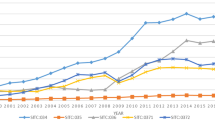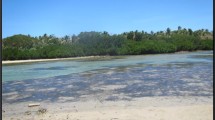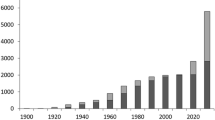Abstract
Although Israel plans to remain self-sufficient in freshwater, that goal comes at a high cost. Both Israel and its neighbors would be better off if countries with an abundance of freshwater exported some of that resource to Israel, which would in turn share it with Palestine and Jordan. A simple 2×2×1 variant of the Heckscher-Ohlin-Samuelson model, incorporating costs of transport, illustrates the advantages of international trade in freshwater. Not only does trade foster an efficient allocation of a scarce resource across countries, but also, by establishing a highly visible market price for importing water, promotes its efficient allocation among competing uses within countries. The classic marginal conditions for efficient allocation of water across and within countries, that the present model derives, are applied to empirical data that illustrate how much more efficiently water can be utilized in the Middle East. Given the long and tragic background of strife and distrust in that part of the world, it is a hopeful development that Turkey is now shipping freshwater to Cyprus and is in talks with Israel to extend this trade to that country. There is also the potential for Egypt and Lebanon to profitably export water to Israel. Such trade will not only promote prosperity but, conceivably, can also reduce conflict and deter war in the region.
Similar content being viewed by others
References
Allan, J. A.: 1996, Water: Peace and the Middle East, Tauris, London.
Amery, H. A. and Wolf, A. T.: 2000, 'Water, Geography, and Peace in the Middle East: An Introduction', in H. A. Amery and A. T. Wolf (eds), Water in the Middle East: A Geography of Peace, University of Texas, Austin, pp. 1–18.
Arnon, A. and Weinblatt, J.: 2001, 'Sovereignty and economic development: The case of Israel and Palestine', The Economic Journal 111, F291-F308.
Arlosoroff, S.: 1996, 'Managing Scarce Water - Recent Israeli Experience', in J. A. Allan (ed.), Water, Peace and the Middle East, Tauris, London, pp. 21–48.
Bar-Or, Y.: 2000, 'Restoration of the rivers in Israel's coastal plain', Water, Air, and Soil Pollut. 123, 311–321.
Beaumont, P.: 2000, 'The quest for water efficiency - Restructuring of water use in the Middle East', Water, Air, and Soil Pollut. 123, 551–564.
Brenner, A., Shandalov, S., Messalem, R., Yakirevich, A., Oron, G. and Rebhun, M.: 2000, 'Wastewater reclamation for agricultural reuse in Israel: Trends and experimental results', Water, Air, and Soil Pollut. 123, 167–182.
Cassing, J. H.: 1978, 'Transport costs in international trade theory: A comparison with the analysis of nontraded goods', Quarterly J. Econ. 92, 535–550.
Chivers, C. J.: 2002, The Settlements: Now on the Spot, Builders of Beit El Vow to Continue, The New York Times, 19 April, p. A9.
Dinar, A. and Wolf, A.: 1994, 'Economic potential and political considerations of regional water trade: The western middle east example', Resour. Energy Econ. 16, 335–356.
Dodge, T. and Tell, T.: 1996, 'Peace and the Politics of Water in Jordan', in J. A. Allan (ed.), Water, Peace and the Middle East, Tauris, London, pp. 169–184.
Falvey, Rodney E.: 1976, 'Transport costs in the pure theory of international trade', Economic Journal 86, 536–550.
Feitelson, E.: 2000, 'The upcoming challenge: Transboundary management of the hydraulic cycle', Water, Air, and Soil Pollut. 123, 533–549.
Finger, J. M. and Yates, A. J.: 1976, 'Effective protection by transportation costs and tariffs: A comparison of magnitudes', Quarterly J. Econ. 90, 169–176.
Gophen, M.: 2000, 'Lake Kinneret (Israel) ecosystem: Long-term instability or resiliency?', Water, Air, and Soil Pollut. 123, 323–335.
Gruen, G. E.: 2000, 'Turkish waters: Source of regional conflict or catalyst for peace?', Water, Air, and Soil Pollut. 123, 565–579.
Haddad, M. and Mizyed, N.: 1996, 'Water Resources in the Middle East: Conflict and Solutions', in J. A. Allan (ed.), Water, Peace and the Middle East, Tauris, London, pp. 3–17.
Hass, A.: 2001, Separate and Unequal on the West Bank, New York Times, 2 September, p. 9.
Hirshleifer, J., DeHaven, J. C. and Milliman, J.W.: 1960, Water Supply: Economics, Technology, and Policy, University of Chicago, Chicago.
Hoff, F. C.: 2000, 'The Water Dimension of Golan Heights', in H. A. Amery and A. T. Wolf (eds), Water in the Middle East: A Geography of Peace, University of Texas, Austin, pp. 150–167.
Israel Environment Bulletin: 2000, 'Water Crisis: 2000' 23, Spring.
Israel Environment Bulletin: 2001, 'The Last Drop?', 24, Fall, 30–39.
Kally, E. with Fishelson, G.: 1993, Water and Peace: Water Resources and the Arab-Israeli Peace Process, Praeger, Westport.
Kliot, N. N.: 2000, 'A Cooperative Framework for Sharing Scarce Water Resources: Israel, Jordan, and the Palestinian Authority', in H. A. Amery and A. T. Wolf (eds), Water in the Middle East: A Geography of Peace,University of Texas, Austin, pp. 191–217.
Kohn, R. E.: 2001, 'A Heckscher-Ohlin-Samuelson Model of Immigration and Capital Transfers', Open Economies Review 12, pp. 379–387.
Kolars, J.: 2000, 'The Spatial Attributes of Water Negotiation: The Need for a River Ethic and River Advocacy in the Middle East', in H. A. Amery and A. T. Wolf (eds), Water in the Middle East: A Geography of Peace, University of Texas, Austin, pp. 245–261.
Krugman, P. and Venables, A. J.: 1995, 'Globalization and the inequality of nations', Quarterly J. Econ. 110, 857–880.
Lomborg, B.: 2001, The Skeptical Environmentalist: Measuring the Real State of the World, Cambridge Press, Cambridge.
Lonergan, S.: 2000, 'Forces of Change and the Conflict over Water in the Jordan River Basin', in H. A. Amery and A. T. Wolf (eds), Water in the Middle East: A Geography of Peace, University of Texas, Austin, pp. 45–62.
Lundgren, N.-G.: 1996, 'Bulk trade and maritine transport costs', Resources Policy 22, 5–32.
Marin, C. M. and Smith, M. G.: 1988, 'Water resources assessment: A spatial equilibrium approach', Water Resour. Res. 24, 793–801.
Markusen, J. R.: 1983, 'Factor movements and commodity trade as complements', J. Internat. Econ. 14, 341–356.
Naff, T. and Matson, R. C.: 1984, Water in the Middle East: Conflict or Cooperation, Westview Press, Boulder.
Revkin, A. C.: 2002, Severe Water and Land Loss Predicted Over a Generation, New York Times, 23 May, p. A6.
Roe, T. and Diao, X.: 2000, 'Water, externality and strategic interdependence: A general equilibrium analysis', J. Internat. Develop. 12, 149–167.
Samuelson, P. A.: 1949, 'International factor-price equalisation once again', Economic Journal 59, 181–197.
Samuelson, P. A.: 1954, 'The transfer problem and transport costs, II: Analysis of effects of trade impediments', Economics Journal 64, 264–289.
Shuval, H. I.: 2000. 'Are the conflicts between Israel and her neighbors over the waters of the Jordan River Basin an obstacle to peace? Israel- Syria as a case study', Water, Air, and Soil Pollut. 123, 605–630.
Waters II, W. G.: 1970, 'Transport costs, tariffs, and the pattern of industrial protection', Amer. Econ. Rev. 60, 1013–1020.
Wolf, A. T.: 2000, "Hydrostrategic' Territory in the Jordan River Basin: Water, War, and Arab - Israeli Peace Negotiations', in H. A. Amery and A. T. Wolf (eds), Water in the Middle East: A Geography of Peace, University of Texas, Austin, pp. 62–120.
Zeitouni, N., Becker, N. and Schecter, M.: 1994, 'Models of water market mechanisms and an illustrative application to the Middle East', Resour. Energy Econ. 16, 303–319.
Author information
Authors and Affiliations
Rights and permissions
About this article
Cite this article
Kohn, R.E. Israel's Need to Import Freshwater. Water, Air, & Soil Pollution 143, 257–270 (2003). https://doi.org/10.1023/A:1022895818242
Issue Date:
DOI: https://doi.org/10.1023/A:1022895818242




